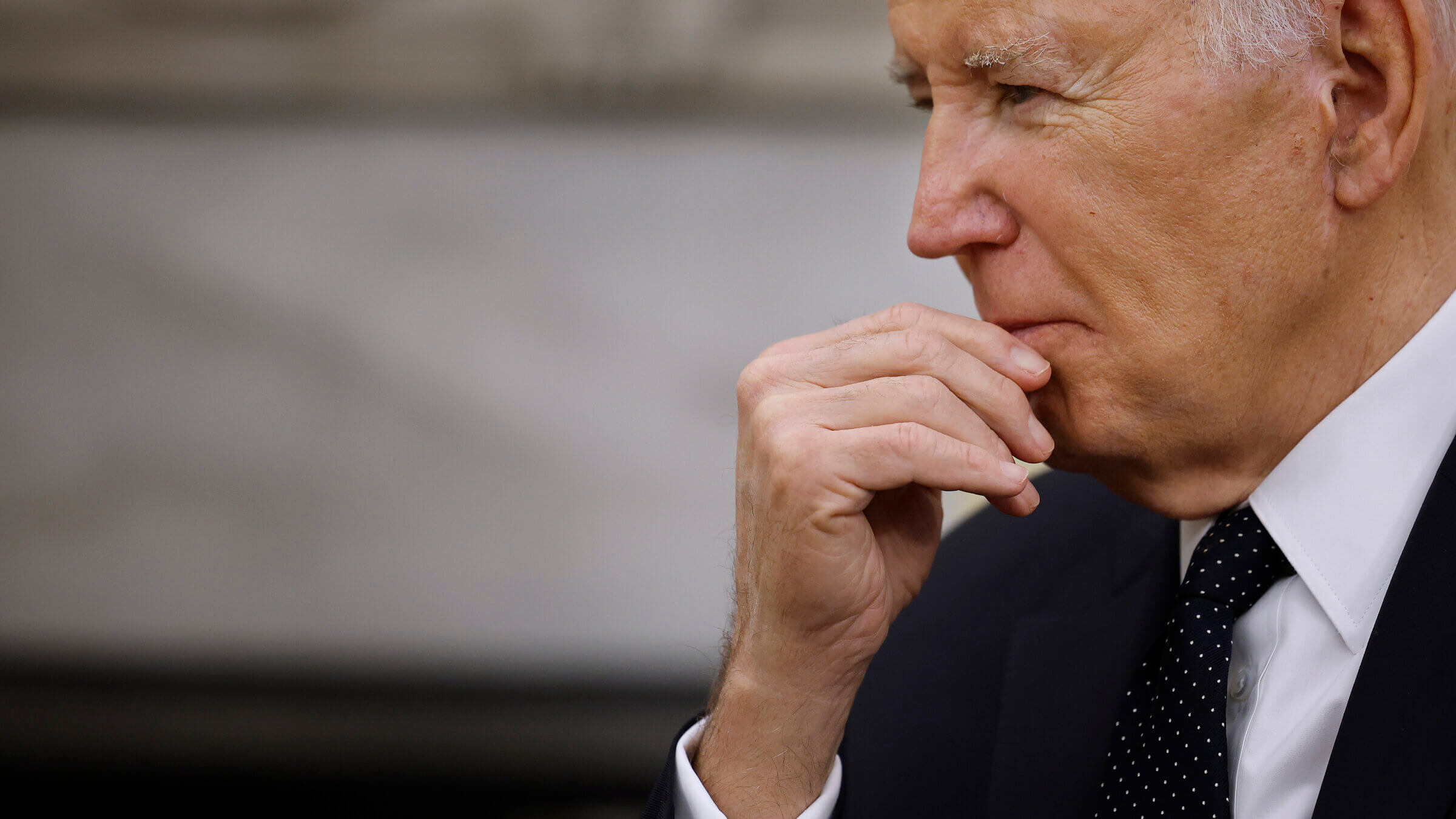Why it matters that Biden says antisemitism has become ‘ferocious’
In an impassioned speech, the president sounded an important alarm about ‘one of the world’s oldest forms of prejudice and hate’

President Biden in the Oval Office at the White House. Photo by Getty Images
Speaking at a Capitol Hill event organized by the U.S. Holocaust Memorial Museum, President Joe Biden described the rise of antisemitism in the United States since Oct. 7 as “ferocious.”
“As Jews around the world still cope with the atrocity and the trauma of that day and its aftermath, we have seen a ferocious surge of antisemitism in America and around the world,” Biden said.
I quickly consulted dictionaries. “Ferocious,” as I suspected, stems from the look of a situation.
As the Merriam-Webster dictionary points out, “ferocious” comes from the Latin feroc-, ferox, literally, fierce looking, from ferus + –oc-, –ox (akin to Greek ōps eye).
Biden’s word choice zeroed in on two questions that have shaken college campuses, and American public life more broadly. Does it look like antisemitism? And is it really antisemitism?
But there is also something quieter, something behind the scenes, something that cannot always be seen. It is a relentless campaign that insists that the look of the situation — specifically, how it might look to you as an individual with eyes and a personal history — is not valid.
Bullying into a point of view
That intellectual bullying is what I thought of when I heard “ferocious.”
As a professor, I have been bombarded with emailed missives from the literary and academic community, insisting that whatever statement they are making is “not antisemitism.” I see statements insisting that thinking that Israel’s war on Hamas is not “genocide”— is “illogical.” Yet at the same time, I have a stream of Jewish students — most of whom I do not directly teach and who sought me out because of my name and identity — coming to my office to express their fears from statements and actions of fellow students, and occasionally, faculty.
These students have eyes and ears too.
I have also been receiving anguished emails from young writers around the country who insist that they support Palestinian rights, yet despair because they have been explicitly told by their mentors that there is, as one graduate student wrote me, “no place for me in the poetry world if I believe Israel has a right to exist.”
Ferocious as cruel and violent
Beyond the roots of the word, the multiple meanings of “ferocious” are striking, as are examples of its current uses in English.
Savagely fierce, cruel, or violent,” the Oxford definition, stuck with me.
“Savagely fierce” reminds me of the attitude that a young poet — an entirely secular person who identifies as left-wing — encountered from his rather well-known teachers, who all see themselves as antiracist educators. When I hear synonyms like “savage, wild, feral, untamed, predatory,” I think of a direct call for violence and murder, something like the memorable statement of Khymani James, a leader of the Columbia University student protests, who became instantly famous for saying in a video recording, “Zionists, they shouldn’t live in this world,” and comparing Zionists to others “who don’t deserve to live” such as Nazis, fascists and racists. “I feel very comfortable — very comfortable — calling for those people to die.”
The White House specifically condemned James’s comments.
“These dangerous, appalling statements turn the stomach and should serve as a wakeup call,” Andrew Bates, deputy White House press secretary, said in a statement. “It is hideous to advocate for the murder of Jews.”
James apologized. But not every comment from a college student gets a call-out from the White House, as I learn each week, listening to stories in my office.
Secondary definitions of “ferocious”
Back to the dictionary.
There is the concept of a “ferocious conflict,” which, the Oxford points out, is “characterized by or involving aggression, bitterness and determination.”
That also sounds relevant. The dictionary even offers the example of “a ferocious argument” and a final definition, “extreme and unpleasant,” with the example of “a ferocious headache.”
To be clear, Biden was in no way saying that the protesters are animalistic; nor was he saying that they were a headache. Rather, he was calling the increase in antisemitism a “ferocious surge.”
But “ferocious” and its many layers of meaning, from “extreme and unpleasant” to “savage” is an interesting word to consider when it comes to the increase — and tone — of recent rhetoric on Israel and Jews, and to the debate about what, exactly, is off-limits.
I would argue that the “surge” has encompassed all these meanings.
And I think the phrase “ferocious surge” also highlights how much the president’s words matter — and in its power, focuses attention on what the president’s job really is.
What the president’s words mean — especially now
“I’m a believer as a former chief of staff that the president has to make clear to the American people exactly what’s going on,” Leon Panetta, former head of the CIA and former White House Chief of Staff, told Bloomberg News shortly after Biden’s speech.
“And the president did speak to the demonstrations. I think the President probably needs to speak more clearly to the American people about what the future path of this war is.”
“Because if it’s just, you know the United States putting pressure on Israel not to do certain things, frankly I think that just creates a lot of confusion about just where the United States stands on this issue.”
That seemed to be something that might be useful to discuss in a campus context. What exactly is America’s position, and why?
“I think the United States understands that Israel has the right to defend itself, that it has the right to go after Hamas’ leadership, that it has the right to make sure that what happened on Oct. 7 never happens again. At the same time, it is important to recognize that we have to get the hostages back and we have to provide humanitarian aid. I don’t think those goals are necessarily in conflict.”
Biden on now — and back then
At the Holocaust museum, Biden told us what he sees in detail.
“Vicious propaganda on social media. Jews forced to keep their — hide their kippahs under baseball hats, tuck their Jewish stars into their shirts. On college campuses, Jewish students blocked, harassed, attacked while walking to class,” Biden said. “Antisemitism, antisemitic posters, slogans, calling for the annihilation of Israel, the world’s only Jewish state.”
It’s a speech worth reading in its entirety, because it also offers a view of history.
“Germany 1933, Hitler and his Nazi Party’s rise to power by rekindling one of the oldest forms of prejudice and hate: antisemitism. His role didn’t begin with mass murder; it started slowly across economic, political, social and cultural life. Propaganda demonizing Jews. Boycotts of Jewish businesses. Synagogues defaced with swastikas. Harassment of Jews in the street and the schools, antisemitic demonstrations, pogroms, organized riots,” Biden said.
These are elements of history that are certainly on the minds of many Jews.
And in some ways, Biden was amplifying what other officials have already said.
“This is a threat that is reaching, in some way, sort of historic levels,” FBI director Christopher Wray said in a Senate hearing in late October 2023.
“In fact, our statistics would indicate that for a group that represents only about 2.4% of the American public, they account for something like 60% of all religious-based hate crimes.”
The Anti-Defamation League counted more than double the number of antisemitic incidents in 2023 as opposed to 2022 — a shocking 8,873 incidents in the US
Panetta has a point. The president’s job is to let people know what’s going on. To let them see what he sees.
And I would argue, to do it in a memorable way, with a ferocious word choice, one that sticks in the gut.
A message from our Publisher & CEO Rachel Fishman Feddersen

I hope you appreciated this article. Before you go, I’d like to ask you to please support the Forward’s award-winning, nonprofit journalism during this critical time.
We’ve set a goal to raise $260,000 by December 31. That’s an ambitious goal, but one that will give us the resources we need to invest in the high quality news, opinion, analysis and cultural coverage that isn’t available anywhere else.
If you feel inspired to make an impact, now is the time to give something back. Join us as a member at your most generous level.
— Rachel Fishman Feddersen, Publisher and CEO























